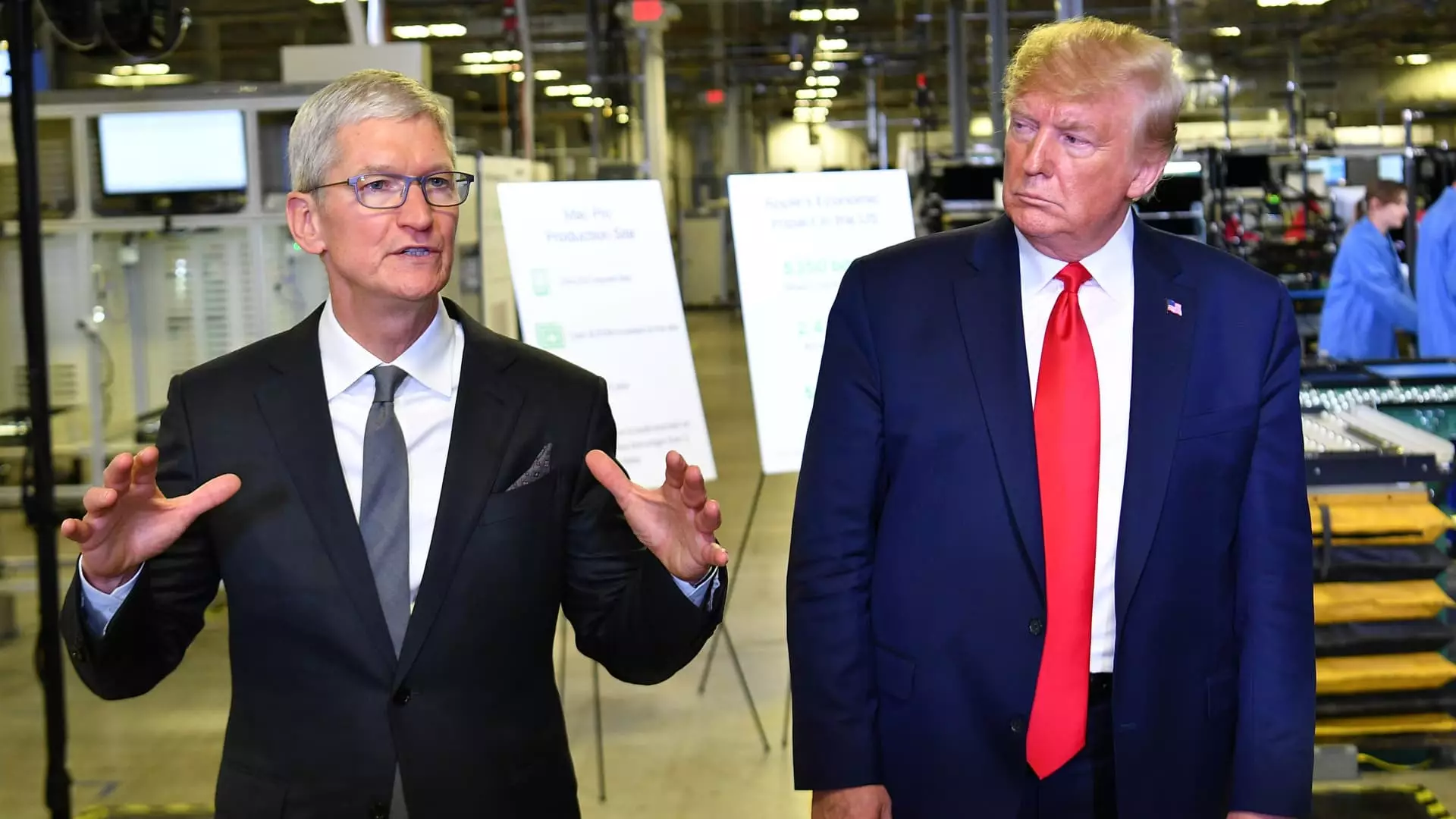As the political atmosphere fluctuates, the spotlight has recently turned towards tech giant Apple and its CEO Tim Cook. In a bold and somewhat reckless move, former President Donald Trump announced a stiff tariff of 25% or more on iPhones manufactured outside the United States. Such statements, widely circulated on social media, not only reflect Trump’s enduring influence in American politics but also signal a growing sense of aggression directed at corporations that rely on overseas production. This is not merely a simple economic maneuver; it is a calculated attempt to tug at the very fabric of American manufacturing and corporate loyalty.
The pressure is mounting on Cook and his team, as Trump has made it clear that he expects Apple to shift its production back to American soil. While the notion of “America first” has been embedded in Trump’s rhetoric, the practical implications for tech companies are daunting. Analysts project that producing iPhones domestically could drive prices as high as $3,500, a staggering increase from the current retail price hovering around $1,000. Imagine the backlash from loyal customers if suddenly forced to pay nearly four times the price for the same product! It’s a classic standoff between nationalistic ambitions and the economic realities of globalized trade.
The Complexity of Global Supply Chains
Apple’s reliance on international manufacturing is not an arbitrary choice; it is a complicated web built over years of strategic decisions aiming to balance cost efficiency, quality, and market competitiveness. Its main production hub has been China, paired with an emerging relationship with India, primarily due to a more amiable trade framework. Trump’s demands to shift this paradigm carry implications not just for Apple’s bottom line but also for the broader tech landscape, where multinational stakeholders are commonplace.
As the government throws down the gauntlet, the viability of the American manufacturing revival remains uncertain. Ideas of “precision manufacturing” being brought back to the U.S. sound appealing, but they veer perilously close to utopian dreams detached from reality. Semiconductor supply chains, a sector critical to Apple, are intricate and require substantial investment in infrastructure and skilled labor. The American workforce is not uniformly equipped for such a transition, raising questions about the practicality of Trump’s strong-arm approach.
Financial Fallout and Corporate Repercussions
Following Trump’s declaration, Apple’s stocks took a noticeable dip. A 2% decrease may seem insignificant at first glance, but for a giant like Apple, such market reactions can amplify uncertainties among investors. Additionally, the company estimates it faces approximately $900 million in extra tariff costs this quarter alone—an unsustainable burden that could lead to tough decisions about layoffs, reduced hiring, or even price hikes for consumers. Corporations like Apple do not operate in a vacuum; their decisions resonate through every level of the economy, impacting jobs and consumer behaviors alike.
More importantly, the fragile balance of consumer demand comes into play. Recent market signals indicate a weakening demand for Apple products, particularly in China, a crucial market for growth. The introduction of enhanced trade-in incentives suggests a desperate attempt to maintain interest among consumers. Yet the ugly truth remains: rising tariffs and dwindling demand could spell disaster for not just Apple, but the entire tech sector.
The Political Undertone and Its Implications
The unfolding saga raises the question of whether this debate is genuinely about enhancing American manufacturing or if it serves as a political maneuver in Trump’s ongoing battle with corporate America. The direct targeting of companies like Apple seems to provoke a sense of duty among corporate leaders and challenges them to take a stand. After all, Cook, who previously donated to Trump’s inauguration fund, now finds himself navigating the choppy waters of shifting political tides, where allegiance offers no tangible safeguard against corporate overreach.
In the vein of a true actor on the international stage, Trump’s tweet-storms are more than just text on a digital platform; they represent a coordinated effort to weaponize tariffs and instigate an environment of fear among corporate titans. As tensions simmer, the bottom line is that we are witnessing an extraordinary clash between a government intent on asserting control and a corporate world grappling with the intricate realities of globalization. How this battle will unfold is uncertain, but one thing is clear: the stakes have never been higher for tech companies striving to navigate this complex landscape.


Leave a Reply